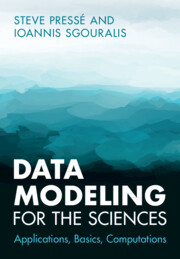
-
Select format
-
- Publisher:
- Cambridge University Press
- Publication date:
- 17 August 2023
- 31 August 2023
- ISBN:
- 9781009089555
- 9781009098502
- Dimensions:
- (254 x 178 mm)
- Weight & Pages:
- 1.06kg, 434 Pages
- Dimensions:
- Weight & Pages:
You may already have access via personal or institutional login
Book description
With the increasing prevalence of big data and sparse data, and rapidly growing data-centric approaches to scientific research, students must develop effective data analysis skills at an early stage of their academic careers. This detailed guide to data modeling in the sciences is ideal for students and researchers keen to develop their understanding of probabilistic data modeling beyond the basics of p-values and fitting residuals. The textbook begins with basic probabilistic concepts, models of dynamical systems and likelihoods are then presented to build the foundation for Bayesian inference, Monte Carlo samplers and filtering. Modeling paradigms are then seamlessly developed, including mixture models, regression models, hidden Markov models, state-space models and Kalman filtering, continuous time processes and uniformization. The text is self-contained and includes practical examples and numerous exercises. This would be an excellent resource for courses on data analysis within the natural sciences, or as a reference text for self-study.
Reviews
‘Data Modeling for the Sciences, co-written by a mathematician and molecular scientist, manages to be rigorous, state-of-the-art, and yet accessible all at the same time. Experimentalists faced with complex data sets who need to take their data science to the next level will find this indispensable, and the book forms a great basis for a data science course in physics, chemistry, or biology departments.’
Martin Gruebele - James R. Eiszner Chair, University of Illinois at Urbana-Champaign
‘This textbook is a foundational treatise that will change how we address our data by educating a generation of students in data-driven tools available nowhere else. A must/required text for the single molecule biophysics field; I’ll definitely require my research students to use it.’
Shimon Weiss - Department of Chemistry and Biochemistry, University of California, Los Angeles
‘This book fills a vacuum that has been growing in the last two decades due to the increasing challenges faced by scientists in the analysis of larger and more complex sets of data. Readers will find the foundations of statistical inference, simulation, and computational modeling formulated in a rigorous yet extremely clear manner. In particular, they will learn how much more powerful a data-driven approach to data analysis can be.’
Carlos Bustamante - University of California, Berkeley
‘This impressive mathematical treatise lays out a rigorous approach for data analysis and modeling of complex physical systems based on a modern data-centric approach, where noisy measurements are used to extract models for stochastic behavior. Presse and Sgouralis are to be congratulated on the breadth and depth of their presentation.’
W. E. Moerner - Stanford University
‘The book is targeted at Masters-level students in the sciences, who will typically have the appropriate computational skills that are assumed, but also at more experienced researchers, who will also find it a very valuable resource … I felt that there was a lot to learn from this book, and I was right, and found it a rewarding read … I recommend the book strongly for anyone involved with analysis of data with any degree of complexity.’
Alan Heavens Source: The Observatory
Contents
-
1 - Probabilistic Modeling and Inference
pp 3-39 -
-
- You have access
- Export citation
-
Metrics
Altmetric attention score
Full text views
Full text views help Loading metrics...
Loading metrics...
* Views captured on Cambridge Core between #date#. This data will be updated every 24 hours.
Usage data cannot currently be displayed.
Accessibility standard: Unknown
Why this information is here
This section outlines the accessibility features of this content - including support for screen readers, full keyboard navigation and high-contrast display options. This may not be relevant for you.
Accessibility Information
Accessibility compliance for the PDF of this book is currently unknown and may be updated in the future.


